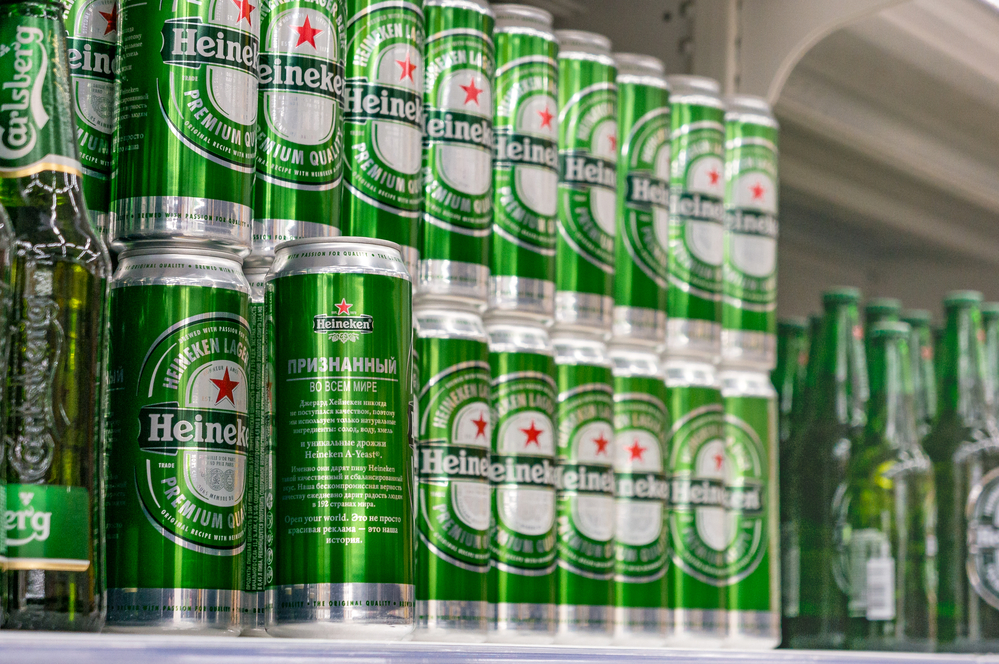The Netherlands’ most popular beer is about to get a bitter taste, as Heineken chooses profits over environmental action and solidarity with Ukraine.
The multinational Dutch brewery is refusing to comply with new statiegeld (deposit) regulations for metal cans in the Netherlands. It was also revealed that Heineken is still active in Russia, despite their promise to halt business after the Russian invasion of Ukraine.
Statiegeld from April 1
Heineken, one of the Netherlands’ largest beer suppliers is refusing to follow new regulations which require Dutch companies to start, as of April 1, selling metal cans with a 15-cent statiegeld, reports NU.nl.
Heineken says that they will continue to produce cans without the deposit symbol all the way until May, even though The Human Environment and Transport Inspectorate (ILT) has made it clear that this is breaking the law.
READ MORE | Recycling in the Netherlands: an international’s guide
From April 1, cans sold in the Netherlands should be produced with a statiegeld symbol so that they can be returned by buyers and then recycled. This already applies to most glass and plastic bottles sold.
Still investing in Russian business
While Heineken is facing fierce criticism for their decisions in the Netherlands, their activities in Russia are not getting much better reactions, reports NU.nl.
Despite Heineken pledging to stop all business activities in Russia as soon as possible after the invasion of Ukraine, a research platform revealed that the branch in Russia is still actively investing in the business more than one year after the invasion.
READ MORE | Here’s how you can help Ukraine from the Netherlands [UPDATED]
The research organisation emphasised that Heineken has recently introduced 61 new products and hired new employees in Russia.
Translation: Heineken fails to put a deposit logo on cans. “61 new products succesfully launched in Russia.” “But this. Nope”
Heineken previously said that the Russian branch operates independently from the Dutch headquarters. However, it’s now clear that the new products in Russia were introduced after consultation with the Dutch office.
Heineken, any comments…?
Responding to fierce criticism, Heineken apologised that they didn’t make their plans in Russia clearer, but insisted that keeping the business thriving was necessary to find a good take-over buyer.
“We recognise that we should’ve been clearer about the need to introduce new products and that questions about this are understandable,” writes Heineken on their website. “We realise that this casts doubts on our pledge to leave Russia. We apologise for this.”
Yes, this was all too little, too late. They made this statement after newsoutlets reveiled they introduced 30 new brands in russia after they promised to leave.— Tristan (@TristanDenneman) March 30, 2023
Heineken also says that they haven’t yet found a suitable buyer, and don’t want the Russian part of the company to go bankrupt.
They cite the risk for their 1,800 employees in Russia and the risk of criminal prosecution for deliberate bankruptcy which is punishable in Russia. Heineken hopes to sell the Russian part of the company by the first half of 2023.
Companies have had time to adapt
Now responding to the second scandal, the company justified its actions regarding the statiegeld deadline by asserting that they aren’t ready to complete the entire transition by April 1 and that they don’t want to waste cardboard and metal cans.
Heineken told NU.nl that retailers only began accepting cans with the statiegeld symbol from April 1, so they “couldn’t switch earlier.”
It’s worth noting that this regulation was supposed to come in in 2022, but was already delayed by multiple months.
The Human Environment and Transport Inspectorate (ILT) in turn responded that if Heineken does not change their decision, they will intervene: “And we will. Companies have had enough time to adapt.”
Will you continue to buy Heineken beer? Tell us your thoughts in the comments below!



Just so you know why companies working in russia is such a big deal – in 2019 heineken paid 400 million euros of taxes to the budget of russia. That alone is a price of the 2 Buk missiles – the one which downed the MH17 plane in 2014.
And with many companies leaving russia in 2022 and now, heineken has even bigger sales in russia.
Without heineken, or nestle or unilever or barilla people would have to purchase from local producers, who tend to avoid paying taxes, and prefer to pay salaries to people under the table rather than officially.
russians will not starve without metro\macro or nuttela, but russia will have less money to produce weapons killing Ukrainians